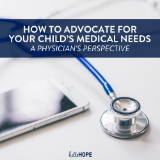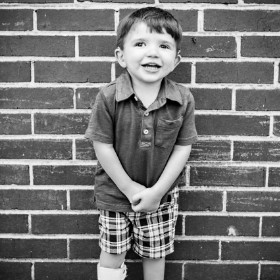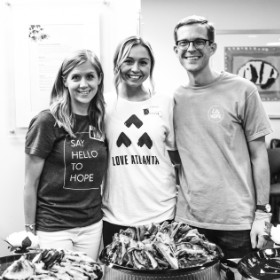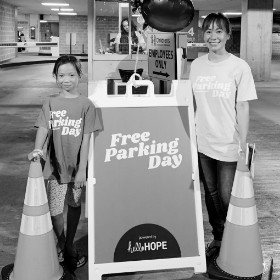10 Things to Consider When Choosing Treatment Options for Your Child: An Interview with Developmental Expert Amy O’Dell
Jacob’s Ladder Neurodevelopmental School and Therapy Center is one of the most beautiful places in Atlanta. They serve students who have been diagnosed with Pervasive Developmental Delay, Autism, Asperger’s Syndrome, Down Syndrome, Attention Deficit Disorder, ADHD, Apraxia, EDBS, Anxiety Disorder, Oppositional Defiant Disorder, a Learning Disability, Traumatic Brain Injury, Cerebral Palsy, Bipolar Disorder or any other developmental syndrome.
Their staff pairs the utmost professionalism and the latest scientific research with deep love and hope in each and every child they serve at their beautiful campus. Jacob’s Ladder is truly a haven for families in Atlanta and beyond.
We recently had the opportunity to meet with Amy O’Dell, the founder of Jacob’s Ladder, and dialogue about the journey of receiving a neurological diagnosis for your child and determining a path forward. After investing more than 20 years in this field, both as a professional and a mother who has personally walked this road, she is truly a wealth of both knowledge and wisdom. Her philosophy is encompassed below:
1. Start from a place of truth.
I think the greatest way to give love to other people is to start from a place of truth. Whatever the truth is. The truth can sometimes be painful to stare down, but if you start from that place and can have a trusting relationship, then it gives you a platform to start from a place that feels like the cleanest, the clearest, and the best way to partner with people.
2. Pick your path and devote yourself to it, one step at a time.
Immediately after establishing that point of truth is focusing on the next step. Not the next 1,000 steps. Let’s just focus on the next step to keep us moving forward.
I know for me personally, before I had chosen a path for Jacob that made sense in terms of his healing and recovery, I had a whole lot of energy and a whole lot of anxiety and fear around where we were and a list of what-ifs. I had all the great intention in the world to move forward, but I didn’t really have a plan. Once I had chosen my way forward, all the energy that I had that was floating around — the fear and the anxiety of the unknown — I funneled into my plan for growth moving forward.
I let go of the what-ifs in the future because those rang loud. What if we can’t do this, what are we going to do if this happens, what if you never... I had to let go of all that. If my mind went there, I would remind myself to come back to where we are and the truth of this moment and my next step forward.
3. Dialogue respectfully with your spouse, especially if there is a disagreement on what services your child needs.
Avoiding conversation is not helpful. Trying to package it in a certain way is not as helpful as just saying, “Can we sit down and talk about something that’s probably going to be difficult for both of us? I would like to share with you what I see. Here’s what I believe about this. Can you tell me what you see and believe?” Respectfully have that conversation.
At the end of that conversation, if there needs to be another one next week, that’s ok. Eventually one parent might say, “I would really like to pursue this evaluation or this test or this opinion that so-and-so told me about.” I think that works really beautifully if you can get through that process.
I have had families come in where one parent came to the appointment begrudgingly. Then, once we all have a conversation and see it all — see the truth, all the pieces, and the parents’ perspective (both parents’ perspective because both perspectives matter) — then you can have that conversation of where we really are. The great thing about the truth is the truth is the truth. Then we can ask questions. Does it match what you see to be real? What doesn’t match what you see? You can each bring your perspective and have a respectful and honest conversation. Find out where you overlap and ask where you can go forward from that overlap.
4. Look at the whole picture.
If a child shows up with a learning disability or if they are nonverbal, the first question isn’t how we are going to address being nonverbal. It’s what does this whole picture look like and how do we form a path forward? It’s a program that’s very specific that takes all these different things into consideration so that we are doing the deepest and best job that we possibly can moving forward. I think that’s what families deserve.
We spend time with the child, and we will spend time with the family, going through an extensive process with both. We ask a lot of questions, but it’s to understand fully where they truly are behaviorally, socially, emotionally, physiologically, neuro developmentally, and academically. It all matters. From how they sleep to how they digest their food to what it looks like when they run across the playground. Can they run yet? It all adds up to one total picture.
I just had a family come in that moved here from Israel for a year to come to Jacob’s Ladder. After two or three days here, the mom said to my team, “I can’t believe you actually listened to me. No one has ever listened to me.” I thought, “Wow, of course we listened to you.” We really listened. We listened to the fears, we listened to the hopes, the dreams, the struggles in the family. Everything that needed to be said about her son. We listened to all of it. All of that got folded into our path forward.
5. Consider the environment.
I really believe that how we are relationally with the children that we work with is key. That’s why, here at Jacob’s Ladder, it’s a balance of science and love. We have a methodology training, which is the science side, and we have a hope, truth, and love training. The connection and the commitment to the relationship with the family and the child are very important to us. If you are going for treatment and that is absent, then that’s a problem.
6. Believe in the power of change enough to invest time in it.
For so many children that are struggling with a diagnosis and whose family is trying to make headway and progress and gain new function, my belief is that it takes more time than most people are led to believe. The reasoning behind the model here at Jacob’s Ladder is that if you are really going to overcome some of the obstacles that the children we serve face, then an hour here and an hour there, so many times is just not adequate.
If you are picking the best path forward, discern the things that you have found that are the most helpful. Do as much of it as you can and learn how to do pieces of it yourself at home. It goes back to our methodology at Jacob’s Ladder about neuroplasticity. The brain is going to change, grow, develop, and create new capacity based on the stimulation it receives. If it receives 30 minutes a week, the brain is going to be stimulated for 30 minutes. If it takes another week to get that next 30 minutes, then there is so much time there that hasn’t been utilized in a way that could have been super helpful. We discern so carefully what every student needs and then do our utmost to deliver that 4 to 6 hours a day. At the end of a year's time, we can say that 5 days a week, 6 hours a day, they got what they needed moment by moment by moment. I think that’s really critical.
7. Seek joy today.
Live in acceptance and joy of the present moment because there is tons of joy in it if you would stay quiet and look. There’s tons of it. The fear in the swirl of anxiety and the what ifs is still real...down the road is he going to go to high school and is he going to go to college and will he ever drive and will he ever live independently? All of those things that you wonder are natural.
I would coach people that the moment that voice kicks in, recognize it quickly and go back to having faith in your process. For me, it’s faith in God. I think the beauty of it is that when you get in this painful place, it starts peeling away layers of what you thought was important in life. The things that used to take your energy and attention don’t anymore. Your energy and attention goes to something much more important and much deeper. It makes you dig deeper. I think you can either dig deeper and strengthen yourself or you can feel like a victim of circumstance. I would strongly recommend that you drop the victim of circumstance mentality as quickly as possible and rise up and say, “Here we are. There’s something great to be learned and experienced in this process.”
There is joy in every single moment if I can be wise enough and skilled enough to look for it. There is a God who loves me and who is going to walk me through it if I allow Him to and ask Him to. Release in faith what the longer-term picture looks like. In my experience, when you do that and do it well, there’s so much joy along the path. If you can drop the fear and drop the victimhood and step into a new mindset about it, I believe that growth and joy is possible for every single child and family.
8. Focus on your child’s strengths and gifts.
One of my favorite things about what I get to do every day is to see and talk about all the things that are right in a child — all their strengths and all their gifts. That always exists. We love teaching to those strengths and gifts so that we are moving them forward as quickly as we can.
The challenge points show themselves pretty quickly. Where they have specific areas of weakness, then there is a very specific plan. I don’t believe we should immediately build accommodations around those challenge points. I believe we should say that if all their strengths and weaknesses are true, what are we going to do about these challenges? What are we going to do to try to stimulate and produce growth and change and movement forward?
Even in the situations that seem the most difficult, stay focused on the strengths and gifts and be wise about selecting the first challenge point. You have to be wise about the first challenge point that you start with that gives the greatest impact and the greatest momentum forward. If you choose that wisely, then what I’ve seen is there is another point of impact and another point of impact and another and another.
9. Be your child’s biggest fan.
Even if a child is nonverbal and their body is moving all the time and it seems like they are not plugging into the environment, they are not listening, they are not paying attention, and they are not understanding, I always tell families it’s so important to just assume that they are tracking and listening and following everything you are saying. Even when it really looks like that’s not possible, assume that it is the truth. I have found out on the other side that it’s almost always the truth.
What comes back out from them when they gain their communication ability is mind boggling. What they heard, what they understood, what they processed. They just didn’t have a voice to give their point of view at the time. As a super practical matter, I encourage families to avoid as best as they possibly can discussing their fears, concerns, and their beliefs about what’s not going well in front of their child and to save those for times when the adults are in a room and are processing and thinking about what their next steps are. Purposely have conversation both with and about your child about all the ways that you are proud of them, all the gifts that you see, and all the cool things that you see about them on a daily basis.
I’ve had so many experiences where it’s very easy to focus on the brokenness or the difficulty in the situation. I will just say something simple like, “Even though you are struggling right this second, I think that you are the coolest kid. I am so happy that you’re here. I love the way that you walked into my building. I love the way that you went straight to the fish tank.” Just start talking about the things that were right, and so many times it’s so interesting how immediately that child will rise to their highest level of capability because, in that moment, they were seen and understood. We try to do that as much as we possibly can throughout the day at the school, no matter what the difficulty of the situation is.
For me personally with Jacob, his struggles were very obvious and evident. What was so beautiful about him from the beginning was that he had a very calm and peaceful look in his eye and a very sweet and tender heart. So much around my time with him and what we did together was super relational. It might be reading stories to him that I knew captured a part of him and let him really engage at that level. It was looking at the things he loved and was drawn to and then trying to build them into opportunities for expanded learning.
10. Let your faith be bigger than your fear.
I have a piece of art that says, “Let your faith be bigger than your fear.” It really comes down to that. Is your fear of the unknown and your need to control and know the outcome bigger than your faith? We all want that control so desperately, but it really doesn’t exist. The sooner we know that and then find our truth on the other side, the sooner we can navigate that space. In some seasons it’s not just needing to remind myself about this every week, but every passing moment. However you do that personally, it’s acceptance that it’s going to be a moment by moment battle for the mind. I’m either going to go that way and be encompassed in fear, or I am going to pull myself to this direction and be anchored here.
One of the things we talk about as a staff a lot is that we all have the same number of moments in a day. What are you taking in? What are you hearing, what are you seeing, what are you reading, who is speaking to you? You have to be so careful about what you take in. In Philippians 4:8 it says to focus on and speak about the things that are lovely and pure and holy and of good report. That is so true. If you want to have more peace in your life, then feed yourself things that bring you peace. If you want to feel like the Lord is walking beside you in this, then invite Him in.
Inviting Him doesn’t mean you think about it a couple of times a week. It means honest-to-goodness that every single moment you are bringing yourself back to the moment by moment by moment, especially in the harder seasons. For me, if I feel like God’s not present with me, it’s not because God shifted. It’s because I shifted. I lost focus. He didn’t ever change. I changed. What do I need to do? Bring myself back to that place where I feel fed and held and walked with. The things that do that for me are having a prayer journal, time in the Word every single day, studying, and praying for understanding and wisdom in it all. I believe that if you ask for that, you are given that. Seek, knock. He’ll answer.
If you’d like to find out more about Jacob’s Ladder or watch their video, you can find them here. You may also be interested in reading this hope-filled story of one of the Jacob's Ladder students: Transformed by Hope: Jackson’s Story with Oppositional Defiant Disorder (ODD), Attention Deficit Hyperactivity Disorder (ADHD), and Sensory Processing Disorder (SPD)
Note: As always, consult your child's physician first on any treatment decisions.













